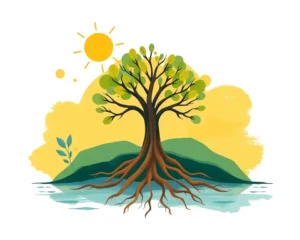Ever get that feeling that you’re just cruising through life on autopilot? Trust me, I’ve been there. You’re busy, caught up in the whirlwind of everyday chaos, and suddenly realize you haven’t stopped to check in with yourself in eons. Am I right? Well, if you’re looking to amp up your self-awareness game and really understand yourself—your emotions, motivations, and goals—then you’re in the right place. Getting a grip on who you are can lead to fantastic outcomes—better relationships, boosted confidence, and an overall sense of well-being. Today, I’m sharing five easy ways you can ramp up your self-awareness journey, so keep reading!
Key Takeaways
- Mindfulness meditation sharpens your focus and emotional intelligence.
- Journaling is a powerful tool for reflection and emotional exploration.
- Feedback from others provides valuable insights into how we’re perceived.
- Self-reflection activities encourage deeper thoughts and evaluations.
- Self-assessment tools quantitatively measure your growth and self-awareness.
1. Practice Mindfulness Meditation
Let me tell you about my first “aha” moment—mindfulness meditation. You hear the term everywhere, but when I finally tried it, oh boy, what a difference! This isn’t just some trendy buzzword; it’s a real game, um, way of training your brain. Think of it like a workout, but for your mind. You sit down, focus on your breath, and boom, you’re in the present moment. It’s about slowing down and tuning in.
Understanding Mindfulness
Before we go further, let’s break it down. Mindfulness is all about being present. You can start with simple breath awareness techniques. Sit quietly, close your eyes, and take a deep breath in through your nose and out through your mouth. Focus only on that—just the rhythm of your breath. Trust me, it’s more effective than you think.
Why is this important? When I practiced this consistently, I noticed I was less reactive during stressful moments. Let’s be real; life throws chaos at us. But with mindfulness, you learn to respond rather than react. You get that mental clarity that helps you make better decisions and communicate more effectively.
Benefits of Mindfulness for Self-Awareness
So, what do you get out of all this effort? When I started meditating, I noticed a boost in my emotional intelligence. I wasn’t just aware of my emotions but understood why I felt the way I did. That kind of insight can lead to personal growth and enhance your relationships.
Here’s what I noticed when I started incorporating mindfulness into my life:
- Enhancing Focus: I became better at concentrating on tasks instead of letting my mind wander.
- Stress Relief: Daily meditation sessions helped me tackle anxiety head-on.
- Self-Discovery: I began recognizing patterns in my thoughts and actions that I wasn’t aware of before.
If you’re not sure how to start, apps like Headspace and Calm are fantastic resources. They offer guided sessions and mindfulness techniques tailored to your needs. Both are super user-friendly, and let’s face it, they make the process engaging and fun. Headspace even has a free version to help you get your feet wet.
2. Keep a Daily Journal
Now, let’s chat about journaling. You might think it’s just for teenage girls writing about crushes, but I’m telling you—it’s way more than that! Keeping a daily journal has been a game changer for many people, including myself. You’re not just jotting down your day; you’re processing thoughts and emotions.
Techniques for Effective Journaling
So how do you journal effectively? First off, there are structured prompts you can follow. You might write about what you’re grateful for or reflect on a challenge you faced that day. This isn’t a chore; it’s an exercise in self-reflection. Try this: spend ten minutes each evening to free-write, just letting your thoughts flow on the page. Trust me, it feels liberating!
I found these prompts super helpful:
- What did I learn today?
- How did I feel in a specific situation, and why?
- What are three things I’m grateful for right now?
Real-life Examples of Journaling Success
And don’t take just my word for it. There are tons of success stories out there. Thousands of folks have shared how effective journaling was in helping them identify trends in their emotions and behaviors. It’s like having a mini-therapist on speed-dial!
“Journaling is like a map of my emotions. I glance back at past entries and see how far I’ve come.”
I remember one individual shared how journaling helped them navigate a tough breakup. By writing down their feelings day-by-day, they began to understand their grief and let go of lingering attachments. Journaling allowed them to turn pain into personal growth.
Using resources like the Q&A a Day journal can also give an interesting framework. It asks you the same questions every year for five years, allowing you to reflect on how your thoughts and feelings evolve over time.
3. Seek Feedback from Others
Let’s tackle the elephant in the room: seeking feedback can feel incredibly intimidating. But guess what? It’s one of the best ways to gain insights into yourself. After all, we’re often not the best judges of our own actions.
Best Practices for Requesting Feedback
When you’re ready to step out of your comfort zone, try framing your questions thoughtfully. Instead of asking, “Do you like my work?” ask, “What’s one thing I could improve?” This opens up a dialogue and gets that constructive criticism flowing. I learned how valuable this was after gathering comments from my peers on a project I led. Not only did it help me improve my future efforts, but it also made me more attuned to how others perceive me.
There’re a few tips to keep in mind when asking for feedback:
- Be open to criticism—it’s not personal.
- Ask for specific areas you want to improve.
- Follow up; thank them for their insights!
How to Handle Feedback Constructively
Once you’ve collected this valuable feedback, here comes the tricky part: handling it! Here’s a pro tip—embrace the discomfort. Negative feedback can sting, but try to view it as a learning opportunity. You’ll build resilience and emotional management skills by learning how to bounce back from critical comments.
“Feedback is a gift. Take it, reflect, and grow from it.”
After receiving feedback on my public speaking skills, I practiced a ton more. The difference was night and day! Think of feedback as a stepping stone toward self-improvement—not a brick wall.
4. Engage in Self-Reflection Activities
Let’s switch gears a bit. Self-reflection activities have been crucial for developing a deeper understanding of yourself. We live busy lives, and it’s easy to just roll with the punches. But by engaging in intentional self-reflection, you’re allowing yourself time to think and learn about your motivations, beliefs, and behaviors.
Activities to Foster Self-Reflection
You might find self-assessment frameworks or guided imagery exercises beneficial. For instance, envision how your ideal life looks. What choices would you make? What changes would lead you there? Pairing that visualization with mindfulness techniques can help clarify your path.
Here are a couple of self-reflection activities you can try out:
- Mindfulness Journaling: Combine journaling with meditation. After a short meditation, write down your thoughts that arise.
- Thought Analysis: Set aside time every week to analyze your reactions to various situations.
Measuring Your Progress
Here’s the cool part: you can track your progress over time! Craft a simple table reflecting your weekly self-reflections, what changes you implemented, and their outcomes.
| Week | Activity | Outcome |
|---|---|---|
| 1 | Mindfulness journaling | Increased clarity on my feelings |
| 2 | Visualization exercises | Identified areas for personal growth |
| 3 | Thought analysis | Improved emotional regulation |
Creating this table not only helps you stay accountable but also lets you visualize your growth journey.
5. Utilize Self-Assessment Tools and Quizzes
Last, but certainly not least, let’s look into self-assessment tools and quizzes! These tools can help you measure your self-awareness quantitatively. They might seem like simple tests, but they give fascinating insights into your personality and emotional intelligence.
Recommended Self-Assessment Tools
Tools like the Myers-Briggs Type Indicator (MBTI) or the Enneagram can illuminate aspects of yourself that you might have never realized. You can find many of them online for free or at a nominal fee. They’re super straightforward to use and honestly provide so much value.
Take the 16 Personalities test. For about $20, you get a detailed report explaining your personality type, strengths, and weaknesses. It’s one of those things that’ll catch you off guard with how accurate it is!
Interpreting Results for Growth
Now, getting results is just the beginning. The real power lies in how you interpret and implement them. Use the insights as a springboard for action! Create a self-improvement plan based on the feedback. For example, if you discover you’re more introverted, focus on social skills development.
You want to turn this information into an actionable growth strategy, and that’s where the magic happens.
“Assessment tools are like a roadmap of your potential. Use them to navigate your growth!”
By actively reflecting on the assessments you take, you’re setting yourself up for continuous self-improvement.
There you have it! With these five self-awareness techniques in your arsenal, you’ve got all the tools you need to truly enhance your understanding of yourself. You’re not just going through life; you’re owning it! So why wait? Get started, and I promise, you’ll be amazed at what you discover about yourself.
Frequently Asked Questions
How can mindfulness meditation improve my self-awareness?
Mindfulness meditation enhances self-awareness by helping you focus on the present moment. This practice encourages you to observe your thoughts and emotions without judgment, leading to greater mental clarity and emotional regulation, which are vital for personal growth.
What are some effective journaling techniques for self-discovery?
Effective journaling techniques include using structured prompts, expressing gratitude, and reflecting on daily experiences. Setting a regular writing schedule can also enhance the depth of your emotional exploration, giving you insights that lead to increased self-awareness.
How do I seek feedback without feeling vulnerable?
To seek feedback effectively, frame your questions clearly, and approach it with an open and receptive mindset. Explain that you’re looking for constructive criticism to improve, which can foster a supportive dialogue and lessen feelings of vulnerability.
What types of self-reflection activities can I try at home?
You can try guided imaging, mindfulness journaling, or simple self-questioning exercises. These activities promote introspection and help identify personal patterns and insights, enhancing your overall self-awareness and understanding of yourself.
Are there specific self-assessment tools I should use?
Consider using personality assessments like the Myers-Briggs Type Indicator, emotional intelligence tests, or self-awareness quizzes available online. These tools can provide valuable insights into your strengths and weaknesses, guiding your personal growth journey.
How can I handle negative feedback constructively?
Approach negative feedback with a growth mindset by viewing it as an opportunity for learning. Take notes on the feedback, reflect on it, and identify actionable steps to incorporate constructive criticism into your personal development strategy.
How can I measure my progress in self-awareness?
You can measure your progress through regular self-evaluations and journaling your thoughts and feelings over time. Look for patterns or changes in your emotional responses and behaviors, which will help indicate areas of growth in your self-awareness journey.
How long should I practice mindfulness meditation each day?
Starting with just 5-10 minutes a day can be beneficial. As you become more comfortable with the practice, you can gradually increase the duration to 20-30 minutes to enhance your awareness and relaxation benefits.
What should I do if I struggle to find things to write about in my journal?
If you struggle with journaling, try using prompts or focusing on specific themes, such as gratitude or personal challenges. Consider free-writing for a set time without worrying about structure, allowing your thoughts to flow more freely and improving your reflective practice.










